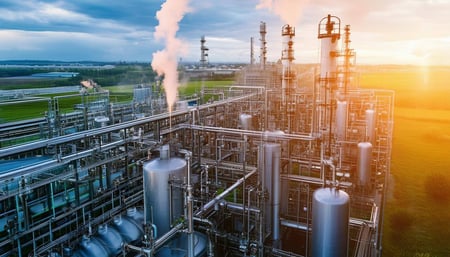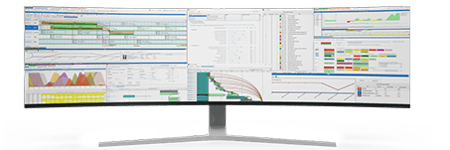Driving Innovation and Sustainability
In chemical manufacturing, staying competitive requires more than just efficient processes; it demands innovation and a keen focus on sustainability. Plant managers are at the forefront of this transformation, tasked with balancing operational efficiency, regulatory compliance, and environmental responsibility. A key enabler of this balance is the integration of advanced planning and scheduling systems like PlanetTogether with powerful enterprise resource planning (ERP) solutions such as SAP, Oracle, Microsoft, Kinaxis, and Aveva.
This blog explores how innovation and sustainability can be accelerated through the seamless integration of these systems, helping plant managers in chemical manufacturing to streamline operations, reduce waste, and align with global sustainability goals.

The Sustainability Imperative in Chemical Manufacturing
Sustainability in chemical manufacturing is no longer just a matter of regulatory compliance; it is a core business strategy that impacts brand reputation, market competitiveness, and long-term profitability. The industry faces growing pressure to reduce greenhouse gas emissions, minimize waste, and transition to more energy-efficient processes. Consumers, investors, and regulatory bodies alike are demanding transparency and measurable progress toward sustainability goals.
However, chemical manufacturing is uniquely complex. Unlike discrete manufacturing industries, where products are assembled from distinct components, chemical manufacturing often involves continuous processes that must be tightly controlled to ensure product quality and consistency. This complexity means that implementing sustainability initiatives can be challenging—balancing resource efficiency, product yield, and environmental impact requires sophisticated planning and control systems.

The Role of Innovation in Sustainable Chemical Manufacturing
Innovation is the engine driving sustainable transformation in chemical manufacturing. It allows plant managers to rethink processes, adopt cleaner technologies, and find new ways to reduce the environmental footprint of their operations. Some areas where innovation is making significant impacts include:
Energy Efficiency: Advanced process control systems can optimize energy consumption by dynamically adjusting operations in real-time, reducing energy waste.
Circular Economy: By integrating waste recovery and recycling processes, plants can reduce raw material consumption and lower the generation of hazardous byproducts.
Advanced Analytics: Predictive analytics and machine learning are enabling more accurate forecasting of demand and resource use, which reduces overproduction and lowers inventory waste.
Alternative Raw Materials: R&D efforts are focused on developing bio-based chemicals and other environmentally friendly alternatives to traditional raw materials, which can reduce dependency on fossil fuels and lower overall emissions.
Carbon Capture and Utilization: Emerging technologies are enabling the capture and reuse of carbon emissions, transforming them into valuable products like fuel or building materials, contributing to a circular economy.
![]()

Why Integration Between PlanetTogether and ERP Systems Is Key
To drive innovation and sustainability, plant managers must have access to real-time data and the ability to make informed decisions quickly. The integration of advanced planning systems like PlanetTogether with ERP systems such as SAP, Oracle, Microsoft, Kinaxis, or Aveva offers a powerful solution by creating a unified, data-driven environment where operational efficiency and sustainability goals can be aligned.
Here’s how the integration can enhance both innovation and sustainability in chemical manufacturing:
Real-Time Visibility and Control
Integrating PlanetTogether with ERP systems provides real-time visibility into production processes, inventory levels, and resource allocation. This allows plant managers to make data-driven decisions that optimize efficiency and minimize waste. For example, through this integration, managers can monitor energy usage, water consumption, and emissions data in real time, allowing for quick adjustments to reduce environmental impact.
Real-time control also enables more agile responses to changes in market demand, which reduces overproduction—a key contributor to waste. When integrated with powerful ERP systems, these advanced planning tools ensure that every decision aligns with both operational targets and sustainability objectives.
Optimized Resource Utilization
Chemical manufacturing is resource-intensive, involving the consumption of energy, water, and raw materials. Integration between PlanetTogether and ERP systems helps optimize resource usage by improving production planning. For instance, by leveraging advanced analytics and machine learning algorithms, the integrated system can suggest production schedules that minimize energy use or reduce the need for hazardous chemicals.
The result is more efficient production cycles that lower energy consumption, reduce emissions, and improve the overall sustainability of the manufacturing process. Furthermore, better inventory management helps reduce the risk of material obsolescence, which leads to less waste.
Enhanced Collaboration and Cross-Functional Alignment
Sustainability initiatives require collaboration across different departments—R&D, procurement, production, and supply chain management. The integration of PlanetTogether with ERP systems enables better collaboration by breaking down data silos and providing a single source of truth for all departments.
For instance, production teams can collaborate with R&D to test new, sustainable raw materials, while procurement can ensure that these materials are sourced from environmentally responsible suppliers. By aligning production schedules with sustainability goals, plant managers can ensure that their operations contribute to broader corporate sustainability strategies.
Proactive Regulatory Compliance
The chemical industry is heavily regulated, with stringent rules around emissions, waste disposal, and safety. Compliance with these regulations is critical for avoiding fines, reducing operational risk, and maintaining a company’s reputation. Integrating PlanetTogether with ERP systems allows for better tracking of compliance data in real time.
This proactive approach means that plant managers can stay ahead of regulatory requirements, making adjustments to production processes before issues arise. Automated compliance reporting also reduces the administrative burden and provides transparency to stakeholders, ensuring that the plant is aligned with environmental regulations.
Data-Driven Sustainability Reporting
Sustainability metrics, such as carbon footprint, energy usage, and waste generation, are becoming essential parts of corporate reporting. PlanetTogether’s integration with ERP systems allows plant managers to easily track and report on these metrics. The real-time data captured by the integrated system can be used to generate detailed reports that demonstrate the plant’s progress toward sustainability goals.
These reports are valuable not only for internal decision-making but also for communicating progress to external stakeholders, including investors, customers, and regulatory bodies. With accurate, real-time data at their fingertips, plant managers can demonstrate their commitment to innovation and sustainability.
As the chemical manufacturing industry continues to evolve, plant managers must embrace innovation and sustainability as intertwined objectives. The integration of advanced planning systems like PlanetTogether with ERP solutions such as SAP, Oracle, Microsoft, Kinaxis, and Aveva is a critical step in this journey. By enabling real-time visibility, optimizing resource utilization, and enhancing collaboration, this integration helps plant managers drive both operational excellence and sustainability.
In a world where sustainability is becoming a key differentiator, those who harness the power of advanced technology to innovate and reduce their environmental impact will not only comply with regulations but also create long-term value for their companies and the communities they serve. By leveraging the capabilities of integrated systems, chemical manufacturing plants can become more agile, efficient, and sustainable—setting the stage for a cleaner, greener future.
For plant managers in the chemical manufacturing industry, the message is clear: embrace the power of innovation, and leverage integrated systems to lead the way in sustainable manufacturing.
Are you ready to take your manufacturing operations to the next level? Contact us today to learn more about how PlanetTogether can help you achieve your goals and drive success in your industry.
Topics: PlanetTogether Software, Integrating PlanetTogether, Enhanced Collaboration, Optimized Resource Utilization, Cross-Functional Alignment, Real-Time Visibility and Control, Chemical Manufacturing, Proactive Regulatory Compliance, Data-Driven Sustainability Reporting




















LEAVE A COMMENT